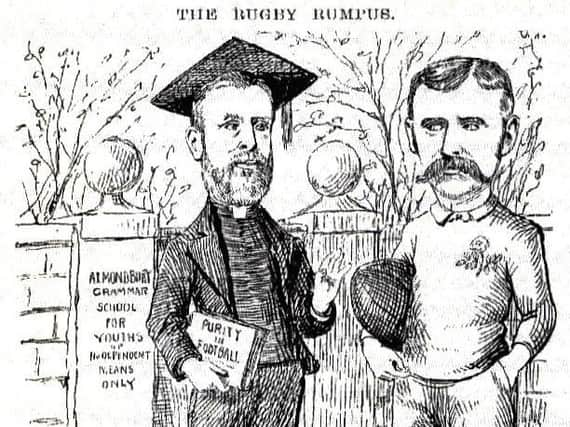No blue plaque for 'divisive figure' who helped to split rugby


The Old Almondburians Society, made up of former staff and students at King James’s School in Almondbury, applied last year to commemorate Rev Francis Marshall, who was headmaster of the-then Almondbury Grammar School from 1878 to 1896.
It sought listed building consent to place a 400mm plaque above the entrance to the former schoolhouse on the Grade II-listed campus.
Advertisement
Hide AdAdvertisement
Hide AdHowever its proposal has been refused by planners with Kirklees Council following vociferous objections.
Rev Marshall was a controversial figure who fought for rugby to remain an amateur sport, which was a major cause of the split that resulted in the formation of the professional game at Huddersfield’s George Hotel in 1895.
Critics including sports academic Professor Tony Collins said that in the 1880s men like Marshall felt threatened by the dominance of working class players.
They aimed to make rugby a completely amateur sport. That meant that players who took take time off work to participate in matches could not be compensated for lost wages.
Advertisement
Hide AdAdvertisement
Hide AdMoreover, the Rugby Football Union decreed that anyone who accepted payments for playing the game would be suspended or banned.
Elected president of the Yorkshire Rugby Union in 1890, Marshall was at the forefront of what was described as “a witch-hunt” by helping to conduct numerous trials of clubs and players suspected of payments.
Professor Collins wrote: “The chaos caused by Marshall’s campaign against payments fuelled the demand for players to receive ‘broken-time’ payments to compensate them for lost wages.
“But Marshall refused to compromise. In 1893 he helped to suspend his own club, Huddersfield, for breaching the amateur regulations.
Advertisement
Hide AdAdvertisement
Hide Ad“He even backed the suggestion that players who informed on other players for receiving money should be given a £20 reward, confirming the suspicion that it was not money that was the problem for the RFU but who was receiving it.
“He fully backed the RFU during the 1895 split as well as its subsequent blacklisting of all those connected with the Northern Union.
“In 1896 he left Almondbury to become rector of Mileham in Norfolk, disappearing from active involvement in rugby. He died in 1906.”
Addressing the notion of the blue plaque, Professor Collins wrote: “Why would a man seen as a divisive hypocrite in his own era be honoured in ours?”
Advertisement
Hide AdAdvertisement
Hide AdThere were other objections. One said: “The blue plaque is for a man who had only scorn for the working classes, so how can it be appropriate for a blue plaque to be erected on the premises of a state-funded comprehensive school?”
Another said Marshall’s stance amounted to pursuing “a vengeful vendetta against the ordinary working man in Huddersfield”.
They added: “For a town which prides itself on being the birthplace of the Northern Union, which later became rugby league, to celebrate in any way the arch enemy of that achievement seems a very odd thing to do.”
In refusing listed building consent for the blue plaque, the council noted that Marshall “remains capable of provoking strong feelings today”.
Advertisement
Hide AdAdvertisement
Hide AdA planning officer stated: “Marshall was an influential rugby union official, but he did not seek to resolve the issue of professionalism through positive actions such as seeking to find compromise, common ground and reconciliation.
“Instead, he took actions that caused hardship to others and drove them apart.
“Whether his actions were driven by prejudice towards working class people or by his adherence to the purity of amateurism in rugby union is debatable, but his words and actions would be out of place in contemporary society without contextual explanation.”